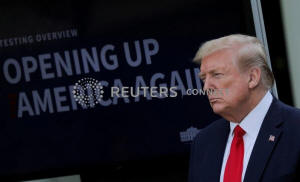U.S. judges press Trump administration over subpoena fight
 Send a link to a friend
Send a link to a friend
 [April 29, 2020]
By Lawrence Hurley and Jan Wolfe [April 29, 2020]
By Lawrence Hurley and Jan Wolfe
WASHINGTON (Reuters) - U.S. appeals court
judges on Tuesday appeared skeptical about broad arguments made by the
Trump administration that the House of Representatives cannot sue to
enforce a subpoena demanding testimony of a former senior White House
official.
Holding arguments by phone because of the coronavirus pandemic, the U.S.
Court of Appeals for the District of Columbia Circuit considered whether
a House committee can sue in an effort to obtain testimony from former
White House Counsel Donald McGahn.
The nine judges heard the case alongside another dispute between the
House and the Trump administration over President Donald Trumpís
announcement that he would spend $8.1 billion for a wall on the
U.S.-Mexico border despite the fact Congress had appropriated only
$1.375 billion.
Although the panel appeared generally sympathetic to the House's
arguments, some judges seemed concerned about opening the door to the
House suing over all manner of issues, including policy disputes and
military conflicts.

Courts are generally wary of weighing into such politically divisive
issues, in the hope that a compromise will be reached.
Judge Judith Rogers appeared skeptical of the notion that courts cannot
intervene when the executive branch and Congress are at odds. "Are you
of the view there can be no role for the courts in terms of preserving
the separation of powers?" she asked Hashim Mooppan, a Justice
Department lawyer arguing for the Trump administration.
Judge David Tatel, referencing separate cases now at the Supreme Court
concerning the House's effort to obtain President Donald Trump's
financial records, questioned whether the Justice Department's arguments
are consistent. The Justice Department has said Trump can sue to block a
subpoena but the House cannot sue to enforce one.
Judge Nina Pillard probed Mooppan on the scope of his argument that
Congress can use political tools like withholding appropriations to
force compliance with its subpoenas.
ďIím struggling to see how that theory applies" in the McGahn case
because Congress has a long history of obtaining information from the
executive branch, she added.
[to top of second column]
|

President Donald Trump attends a coronavirus response news
conference in the Rose Garden at the White House in Washington,
U.S., April 27, 2020. REUTERS/Carlos Barria

A divided three-judge panel of the court ruled for Trump in
February, saying the court had no place in settling the closely
watched dispute between the executive and legislative branches of
the U.S. government.
The panel of nine judges has a 7-2 majority of Democratic
appointees. Two judges who were appointed by Trump to the court,
Neomi Rao and Gregory Katsas, are not participating, likely because
both previously worked in his administration.
The Democratic-led House Judiciary Committee has said the earlier
2-1 ruling upset the balance of powers created by the U.S.
Constitution.
The committee had sought testimony from McGahn, who left his post in
October 2018, about Trumpís efforts to impede former Special Counsel
Robert Muellerís investigation that documented Russian interference
in the 2016 U.S. election.
McGahn declined to testify before the committee after the Trump
administration advised him to defy the subpoena. The Justice
Department, arguing for the Republican administration, has argued in
court that senior presidential advisers are ďabsolutely immuneĒ from
being forced to testify to Congress about official acts and that
courts lack jurisdiction to resolve such disputes.
The border wall case raises issues similar to the McGahn dispute,
with a district court judge ruling that the House did not have
standing to sue.

Addressing that case, one judge, Thomas Griffith, questioned whether
the lawsuit could be brought by only the House and would also need
to be joined by the Senate, the other chamber of Congress, to be
successful.
(Reporting by Jan Wolfe and Lawrence Hurley; Editing by Peter
Cooney, Jonathan Oatis and Dan Grebler)
[© 2020 Thomson Reuters. All rights
reserved.] Copyright 2020 Reuters. All rights reserved. This material may not be published,
broadcast, rewritten or redistributed.
Thompson Reuters is solely responsible for this content. |